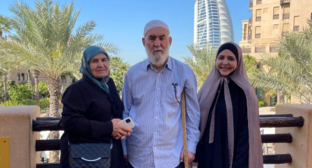18 July 2011, 23:00
Week in the Caucasus: review of main events of July 11 to 17
International Film Festival "Golden Apricot" in Yerevan saw a record number of applications; two years after the murder of Chechen human rights defender Natalia Estemirova her colleagues present results of their own inquiry; Victor Dvorakovskiy, "Russian Wahhabi" suspected of preparing terrorist attack arrest in the Stavropol region, – look these and other events in the review of the week of July 11-17, 2011, prepared by the "Caucasian Knot".
Armenia: "Golden Apricot" has unprecedented number of participants
Last week Yerevan hosted the 8th International Film Festival "Golden Apricot", where 150 films from more than 40 countries were screened. This year, the festival received a record number of applications – 630 from 81 countries. Its programme comprised four contests: international feature and documentary films, "Armenian Panorama" and a programme of short feature films.
The jury of the festival, which ended on July 17, found the film "Divorce of Nadir and Simina" by the Iranian film director Asgar Farkhadi to be the winner. The film tells about new realities of the modern Iran, which get into irreconcilable contradictions with the old way of life based on religious traditions.
The second prize of the "Golden Apricot" was awarded to the Korean director Park Jung Boom for the film "Musan Diaries", telling about the fate of a refugee from North Korea. Another jury's prize went to the Mexican director Paola Markovich, who is of Argentine origin – her movie "The Prize" tells a story of an Argentine family in the time of military dictatorship. The Hungarian director Bela Tarra received a special honorary prize of the jury "Master" for the film "The Turin Horse".
Apart from screening films, the festival held quite a lot of other events, including parties, jubilee celebrations, roundtables, press conferences and master classes.
Levon Abramyan, an ethnographer and a Corresponding Fellow of the National Academy of Sciences of Armenia, believes that the "Golden Apricot" is the only successful Armenian cultural project, since the festival has surpassed the provincial borders, received international recognition and became one of the most prestigious of the kind.
Chechnya: two years after Estemirova's murder – killers unidentified
On July 15 it was two years after Natalia Estemirova, an employee of the Human Rights Centre (HRC) "Memorial", was kidnapped in Grozny, and on that very day her body with gunshot wounds was found in the Nazran District of Ingushetia. According to investigators, Estemirova was killed by residents of Chechnya – Bashaev brothers – out of personal revenge, allegedly, because she had revealed their links with militants. This version was confirmed on July 15 by the Investigatory Committee of the Russian Federation (ICRF). The investigation into the murder of the human rights defender was extended till November 15.
On July 14, at a press conference in Moscow, the International Federation for Human Rights (FIDH), the "Novaya Gazeta" and the HRC "Memorial" presented a report with the data about their own independent investigation, where they state that the investigation is on a wrong track, and insist on that the results of their investigation were added to the Estemirova's murder case files. The human rights defenders believe that "the 'proofs' contained in the materials of the criminal case give grounds to suspect a deliberate collection of evidences with the aim to make the version of Bashaevs' involvement the main one."
On July 14, St Petersburg hosted a party in memory of Natalia Estemirova dated to the second anniversary of her murder. For the first time in Russia, the party saw the film "Who killed Natasha?" made by a female journalists Milan Solua on the order of the French television. A similar memorial party with the show of the film was also held on July 15 in Moscow in the premises of the International Society "Memorial".
In Grozny, the action in memory of Natalia Estemirova was held in the Journalists' Mini-Park and attracted NGO activists; while Natalia's colleagues – local employees of the HRC "Memorial" – on that day visited the village of Ishkhoy-Yurt, Gudermes District of Chechnya, where Estemirova was buried and where her family lives, to take part in the religious remembrance ceremony named the Mavlid.
Stavropol Territory: Dvorakovskiy, "Russian Wahhabi", accused of terrorism, detained
At night on July 14, in one of the streets of the village of Inozemtsevo, which is an administrative part of the city of Zheleznovodsk, policemen from the Patrol-and-Post Service (PPS) stopped a suspicious young man and asked him to present his documents; however, the young man threw an improvised explosive device (IED) at them and then tried to trigger the second one. Two policemen were injured by the explosion, same as Victor Dvorakovskiy himself: doctors placed him in the intensive care unit and amputated his arm.
According to the Stavropol Territorial Chief Department of the Ministry of Internal Affairs (MIA), Victor Dvorakovskiy, who took Islam just over three years ago and underwent the respective ideological training, was prepared to act as a suicide bomber. He was put on the search list after in March 2011 an IED blew up in the house in Pyatigorsk, where he rented his housing. The police announced a reward of 100,000 roubles for information about him. At present, the investigatory bodies try to find out exactly, where Dvorakovskiy had been hiding and who helped him in this.
There is data that within the last four months Dvorakovskiy did not leave the region and lived in a tent in a forest on Mount Beshtau, which is directly adjacent to the village of Inozemtsevo.
The Stavropol Territory continues searching for three more persons suspected of preparing terror acts – Eldar Bitaev, Ibragim Torshkhoev and Alexander Dudkin.





Комментирование через Кавказский узел